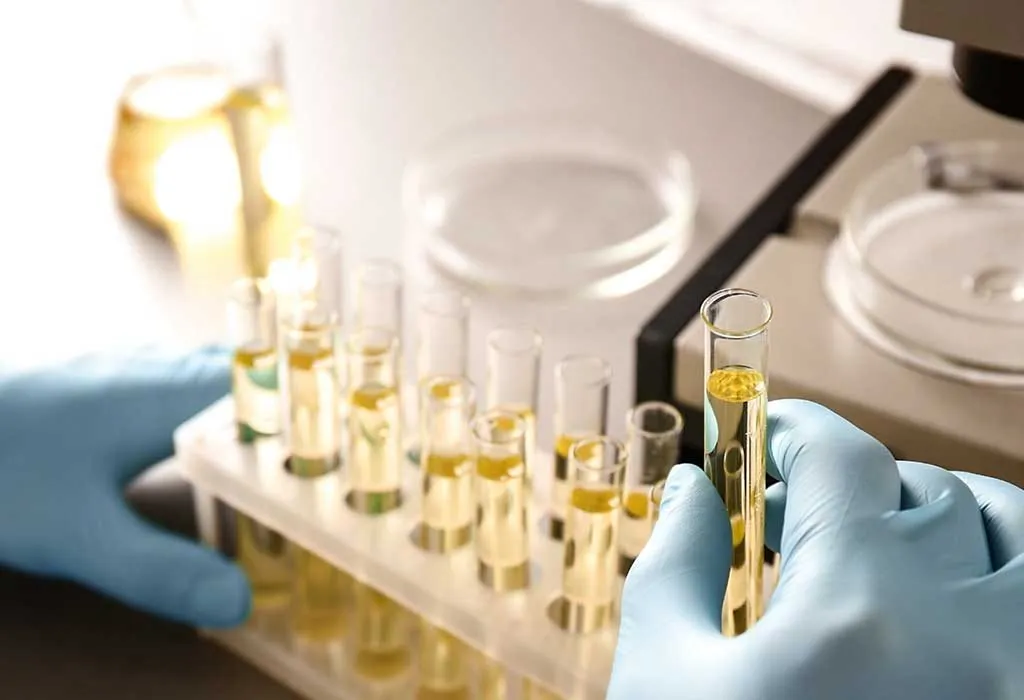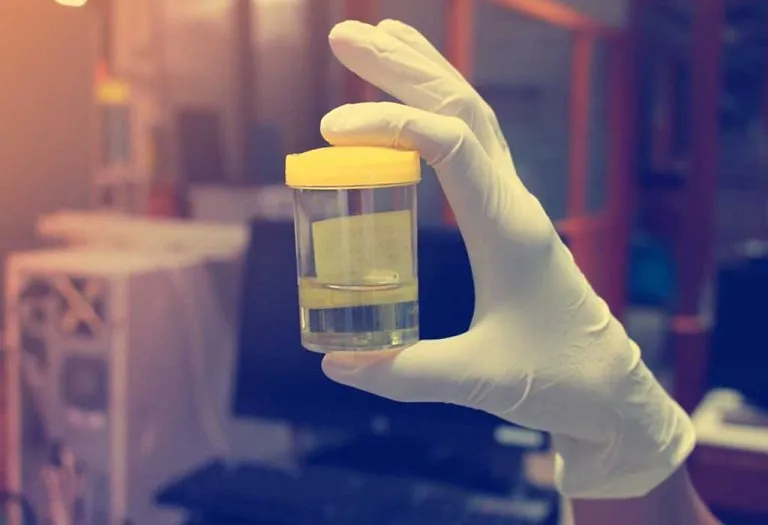Urine Test and Urine Culture During Pregnancy – Importance, Procedure, & Results
- Why Is Urine Test Done During Pregnancy?
- When Is the Test Performed?
- How Is Urine Test Performed in Pregnancy?
- How Often Should a Pregnant Woman Take a Urine Test?
- Preparation for Urine Test During Pregnancy
- What Can the Result of a Urine Test Reveal?
- What Is a Urine Culture Test?
- Why Is Urine Culture Recommended During Pregnancy?
- How Is Urine Culture Test Performed?
- Is There Any Risk of Undergoing a Urine Test During Pregnancy?
- FAQs
Pregnancy is a wonderful and magical time as it is the process of bringing a new life to the world. Doctors take certain precautions just to ensure the mother is healthy. Among the various tests conducted, urine tests and urine cultures play a significant role in ensuring a healthy pregnancy. These tests help detect and manage conditions such as urinary tract infections (UTIs), which are common during pregnancy and if left untreated, can lead to complications such as preterm labour and low birth weight. Here is everything you should know about urine tests during pregnancy.
Why Is Urine Test Done During Pregnancy?
Certain substances in your urine can detect early signs of health conditions. These conditions might cause problems for the baby and yourself. This is why urine tests should be done periodically throughout your pregnancy. A sample of urine is used to determine if a person has kidney disease, diabetes, or even bladder infections by measuring the levels of protein, sugar, bacteria, or any other substances (3).

When Is the Test Performed?
The urine pregnancy test is usually performed during the first prenatal visit to the doctor. She will perform this test and then ask you to check periodically during future prenatal visits. Many doctors check the urine during every prenatal visit.
How Is Urine Test Performed in Pregnancy?
A sample of clear midstream urine is taken in a sterile plastic container. Test strips containing certain chemicals are dipped into the sample to screen for certain diseases. The sterile container prevents bacteria or other secretions from contaminating the sample, ensuring that it does not produce invalid results.
Your doctor will ask for more urine samples if she suspects any kind of infection so that a detailed analysis in the laboratory can be conducted.
How Often Should a Pregnant Woman Take a Urine Test?
Every doctor has a different frequency of asking to perform a urine test. Your doctor will likely ask for a urine sample at your first prenatal visit and then send it to a lab for complete analysis. Some doctors might ask for samples at every visit and test them in the clinic with a urine dipstick test for pregnancy. Some might only ask for this once in a trimester. Others might not ask for a sample more than once unless you show symptoms requiring a urine test (2).
Preparation for Urine Test During Pregnancy
Proper preparation for a urine test during pregnancy can ensure accurate results and a smooth testing process. Here are some important steps to follow:
- Follow Fasting Instructions: If your healthcare provider has instructed you to fast before the urine test, ensure you do not eat or drink anything except water for the specified period.
- Stay Hydrated: Drink plenty of water before the test to help produce an adequate urine sample, but avoid excessive water intake just before the test, as it can dilute the urine.
- Clean the Genital Area: Clean the genital area with a provided antiseptic wipe or as instructed by your healthcare provider to avoid contamination of the urine sample (8).
- Collect Midstream Urine: Start urinating, then stop briefly and collect the midstream urine in a sterile container to reduce contamination from the initial urine stream (6).
- Avoid Certain Foods and Medications: Inform your healthcare provider about any medications or supplements you are taking, and avoid foods that can change urine colour or composition, like beets, berries, or artificial food colouring.
- Label the Sample Correctly: Ensure the urine sample container is properly labelled with your name, date, and time of collection to avoid mix-ups or processing delays.
What Can the Result of a Urine Test Reveal?
Here are the four major conditions that can be found out.

Sugar
- During pregnancy, urine usually has a normal level of sugar. But if blood sugar levels are very high, then urine will also have excess sugar.
- This is seen with gestational diabetes. This is a form of diabetes that is common during pregnancy.
- It occurs when the pregnancy hormones in the body disrupt insulin production.
- If the doctor sees any risk factors or if you have a family history of diabetes, they will ask you to take a blood test for this.
- This mostly occurs during the 20th week of pregnancy. Uncontrolled blood sugar levels during pregnancy might lead to an increased risk of heart and spine problems and kidney defects in the baby.
Bacteria
- The presence of bacteria in urine is a sign of urinary tract infection. However, many women do not show symptoms even if they have a UTI.
- The infection could still spread to the kidneys, causing major problems for the baby.
- It could also increase the risk of having a premature or a low birth weight baby. UTI does not lead to many complications if it is treated properly and quickly.
- If the urine test is positive initially, the doctor might take a urine test culture. This way, the presence of bacteria can be confirmed, and the type of antibiotics can be decided. Many antibiotics are safe, but it is best to consult a doctor before consuming anything (7).
- Doctors usually identify and treat symptomless bacterial infections from the beginning itself.
Ketones
- When fat is broken down for energy, ketones are acidic by-products instead of carbohydrates.
- If you are diabetic, then you are more likely to have large amounts of ketones in your urine.
- This might be an indication of a harmful condition, ketoacidosis, which could further lead to diabetic coma (11).
- Your doctor will first check if your drinking and eating habits are good if you happen to have high ketones.
- If it disappears after eating, then it is not alarming. If you are not able to have food or fluid because of nausea and vomiting, then you should receive nutrients through an intravenous line.
- Treatment for this condition usually takes place in a hospital.
Proteins
- Proteinuria in urine is an indication of a Urinary Tract Infection, chronic kidney disease, or kidney infection.
- When this condition develops, it is an early sign of preeclampsia. This condition might lead to high blood pressure after the 20th week of pregnancy (5).
- It might cause severe problems for the child and the mother.
- If both your blood pressure and proteinuria are normal, your doctor might take a urine culture to identify what is causing protein in the urine during pregnancy.
What Is a Urine Culture Test?
A urine culture test is a practice that finds the type of bacteria present in the urine so that the doctor can prescribe the correct antibiotics for treating that infection (4).
Why Is Urine Culture Recommended During Pregnancy?
A urine culture test is asked to be taken to figure out (9):
- The bacteria are responsible for the urinary tract infection.
- To decide the right kind of antibiotic to treat the infection during pregnancy.
- If the treatment can help clear the UTI completely.
Usually, for urine culture, the pregnant woman is asked to give her urine sample twice. The first time is to check the bacteria causing the infection, and the second time is to check if the infection has been completely cleared up so that there will be no risk for the baby or the mother in the future.

How Is Urine Culture Test Performed?
- The urine sample is first collected from you. The sample is added to a substance or medium that encourages the growth of bacteria on a petri dish in the lab. The culture is said to be negative if there is no bacterial growth and positive if there is a sign of the growth of an organism. Further, it will be able to reveal the exact type of bacteria growing and causing the infection.
- You will be able to get the results in a day or two (10).
- You may be asked to get a urine culture several times through the course of your pregnancy just as a precautionary measure.
- Urinary tract infections due to bacteria might lead to premature labour.
Is There Any Risk of Undergoing a Urine Test During Pregnancy?
Urine tests in pregnancy pose no risk to you and your baby. These tests ensure you and your baby are in good health.
FAQs
1. Can urine tests determine if I’m drinking enough water?
Yes, urine tests can provide some indication of hydration status. Dark, concentrated urine might suggest dehydration, while clear, light-coloured urine typically indicates adequate hydration. Staying well-hydrated is not just important, it’s crucial for maternal and fetal health during pregnancy.
2. How accurate are urine tests and urine cultures during pregnancy?
When properly conducted, urine examination in pregnancy is generally very accurate. Urine tests provide quick results for initial screening, while urine cultures offer precise identification of bacterial infections. However, contamination during sample collection can affect accuracy, so it’s important to follow the instructions carefully when providing a sample.
3. Can urine tests detect other infections besides UTIs?
While urine tests are primarily used to detect UTIs, they can sometimes indicate the presence of other conditions. For example, the presence of abnormal cells or high levels of certain substances can indicate issues like kidney infections or sexually transmitted infections (STIs) (1).
The presence of bacteria, sugar, ketones, or protein in your urine can indicate potential issues with your pregnancy. Early testing and taking proper measures to prevent any kind of disease is crucial. It’s important to consult with your doctor and get urine tests and urine culture done to ensure that you and your baby are healthy and you have a complication-free delivery.
References/Resources:
1. Urine tests; Healthdirect; https://www.healthdirect.gov.au/urine-tests#uses
2. Why Prenatal Urine Tests Are Important; Penn Medicine Lancaster General Health; https://www.lancastergeneralhealth.org/health-hub-home/motherhood/your-pregnancy/why-prenatal-urine-tests-are-important
3. Antenatal checks and tests; NHS; https://www.nhs.uk/pregnancy/your-pregnancy-care/antenatal-checks-and-tests/
4. Routine Tests During Pregnancy; American College of Obstetricians and Gynecologists; https://www.acog.org/womens-health/faqs/routine-tests-during-pregnancy
5. WHY BLOOD PRESSURE AND URINE ARE TESTED DURING PREGNANCY; Manchester University NHS Foundation Trust; https://mft.nhs.uk/app/uploads/sites/4/2018/04/Why-Blood-Pressure-and-Urine-are-Tested-During-Pregnancy.pdf
6. What tests will I have during pregnancy?; Tommy’s; https://www.tommys.org/pregnancy-information/im-pregnant/antenatal-care/what-tests-will-i-have-during-pregnancy
7. Pregnancy and birth: What are the benefits of routinely screening for bacteria in the urine of pregnant women?; National Library of Medicine; https://www.ncbi.nlm.nih.gov/books/NBK343317/
8. Urine tests; Healthdirect; https://www.healthdirect.gov.au/urine-tests#how
9. In brief: Understanding urine tests; National Library of Medicine; https://www.ncbi.nlm.nih.gov/books/NBK279350/
10. Icahn School of Medicine at Mount Sinai; Urine culture; https://www.mountsinai.org/health-library/tests/urine-culture
11. Diabetic ketoacidosis; NHS; https://www.nhs.uk/conditions/diabetic-ketoacidosis/
Also Read:
CBC Test in Pregnancy
GCT & GTT Tests during Pregnancy
Triple Marker Test when Pregnant
Quadruple Marker Test while Pregnancy
Was This Article Helpful?
Parenting is a huge responsibility, for you as a caregiver, but also for us as a parenting content platform. We understand that and take our responsibility of creating credible content seriously. FirstCry Parenting articles are written and published only after extensive research using factually sound references to deliver quality content that is accurate, validated by experts, and completely reliable. To understand how we go about creating content that is credible, read our editorial policy here.



































